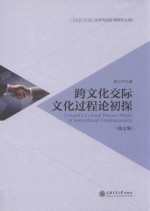图书介绍
跨文化交际文化过程论初探 英文版2025|PDF|Epub|mobi|kindle电子书版本百度云盘下载

- 翁立平著 著
- 出版社: 上海:上海交通大学出版社
- ISBN:9787313138873
- 出版时间:2015
- 标注页数:206页
- 文件大小:26MB
- 文件页数:228页
- 主题词:文化交流-英文
PDF下载
下载说明
跨文化交际文化过程论初探 英文版PDF格式电子书版下载
下载的文件为RAR压缩包。需要使用解压软件进行解压得到PDF格式图书。建议使用BT下载工具Free Download Manager进行下载,简称FDM(免费,没有广告,支持多平台)。本站资源全部打包为BT种子。所以需要使用专业的BT下载软件进行下载。如BitComet qBittorrent uTorrent等BT下载工具。迅雷目前由于本站不是热门资源。不推荐使用!后期资源热门了。安装了迅雷也可以迅雷进行下载!
(文件页数 要大于 标注页数,上中下等多册电子书除外)
注意:本站所有压缩包均有解压码: 点击下载压缩包解压工具
图书目录
Chapter 1 Introduction1
1.1 Statement of the problem and significance of the present research1
1.2 Research objectives and central theme4
1.3 Research questions and hypotheses5
1.4 Research methodology applied7
1.5 Structure of the book7
Chapter 2 Diverse Views of Culture in Intercultural Communication(IC)Studies9
2.1 Conceptualizing culture9
2.1.1 Catcgorization of definitions of culture9
2.1.2 Structural-functional view of culture10
2.1.3 Process view of culture13
2.1.4 Critical view of culture15
2.1.5 Postmodern view of culture16
2.2 Philosophical foundations of diverse views of culture in IC17
2.2.1 Two primary dimensions17
2.2.2 Three paradigms18
2.2.3 Paradigm wars or paradigm integration?20
2.3 Chapter summary22
Chapter 3 The Fixed-Traits View of Culture:A Critical Analysis24
3.1 Nature of the fixed-traits view of culture24
3.1.1 What is culture?24
3.1.2 How do cultures vary?26
3.2 Representations of the fixed-traits view in contemporary IC scholarship28
3.2.1 “Culture”in key IC publications in the US28
3.2.2 “Culture”in selected Chinese IC publications30
3.2.3 A“culture paradox”in contemporary research32
3.2.4 Cultural dimensions and syndromes as“sophisticated stereotypes”34
3.3 Contributions of the fixed-traits view35
3.4 Limitations of the fixed-traits view37
3.4.1 Conceptual challenges38
3.4.2 Empirical challenges42
3.5 Chapter summary47
Chapter 4 Improvements of the Fixed-Traits View across Related Disciplines48
4.1 Multiple-level cultural analysis48
4.1.1 Individual level analysis of culture in cross-cultural psychology48
4.1.2 Individual level analysis of culture in IC studies49
4.1.3 Kulich's cultural analytical matrix50
4.1.4 Summary52
4.2 Emic approaches to culture52
4.2.1 Etic and emic approaches perceived as complementary53
4.2.2 Etic and emic approaches perceived as incompatible57
4.3 Chapter summary61
Chapter 5 The Dynamic Process View of Culture:A Review64
5.1 Defining culture64
5.1.1 Culture as a loose network of shared knowledge65
5.1.2 Uneven distribution of cultural knowledge66
5.1.3 Human agency in culture and psychology68
5.2 Forms of cultural knowledge70
5.2.1 Declarative knowledge70
5.2.2 Procedural knowledge71
5.3 Location of cultural knowledge72
5.4 Application of cultural knowledge74
5.4.1 Availability of cultural knowledge75
5.4.2 Chronic accessibility of cultural knowledge76
5.4.3 Temporary accessibility of cultural knowledge76
5.4.4 Applicability of cultural knowledge78
5.4.5 Moderating factors in cultural knowledge activation78
5.5 Chapter summary81
Chapter 6 Culture as Dynamic Processes in IC82
6.1“Normalizing”culture82
6.1.1 Culture as the whole story82
6.1.2 Culture as part of the story85
6.2 Understanding IC:A dynamic process view of culture87
6.2.1 A cursory review of some key IC models87
6.2.2 Underemphasized intergroup dimensions of IC89
6.2.3 Proposing a cultural process model of IC92
6.3 Chapter summary99
Chapter 7 Initial Tests of the Cultural Process Model of IC(1):Study Ⅰ101
7.1 Culture priming101
7.2 Research background102
7.3 Significance of Study Ⅰ103
7.4 Tentative research hypothesis104
7.5 Pilot study and modified hypothesis106
7.6 Method107
7.6.1 Subjects107
7.6.2 Culture and neutral primes and the social attribution task107
7.6.3 Procedures110
7.6.4 Data analysis111
7.7 Results111
7.8 Discussion115
7.9 Chapter summary119
Chapter 8 Initial Tests of the cultural Process Model of IC(2):Studies Ⅱ and Ⅲ120
8.1 Study Ⅱ120
8.1.1 The proverb sampling method120
8.1.2 The IC dimension of the experiment122
8.1.3 Research hypotheses123
8.1.4 Method124
8.1.5 Data analysis and results125
8.1.6 Discussion135
8.2 Study Ⅲ138
8.2.1 What is“over-tuning effect?”139
8.2.2 The case140
8.2.3 Case analysis144
8.3 Chapter summary151
Chapter 9 General Discussions and Conclusion152
9.1 Summary of the research152
9.2 Theoretical and practical implications of the present research155
9.2.1 Theoretical implications157
9.2.2 Practical implications162
9.3 Limitations of the present research164
9.4 Directions for future research167
Appendixes170
References185
热门推荐
- 1734111.html
- 2955383.html
- 1030961.html
- 2578796.html
- 1869776.html
- 2490881.html
- 1194529.html
- 2365713.html
- 3219186.html
- 2428294.html
- http://www.ickdjs.cc/book_2204681.html
- http://www.ickdjs.cc/book_2771276.html
- http://www.ickdjs.cc/book_980952.html
- http://www.ickdjs.cc/book_797605.html
- http://www.ickdjs.cc/book_2886087.html
- http://www.ickdjs.cc/book_2915748.html
- http://www.ickdjs.cc/book_2002882.html
- http://www.ickdjs.cc/book_2314344.html
- http://www.ickdjs.cc/book_1596232.html
- http://www.ickdjs.cc/book_57002.html